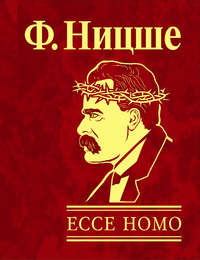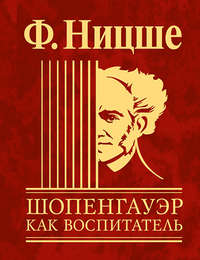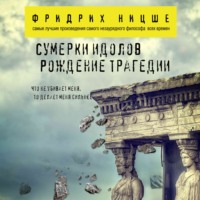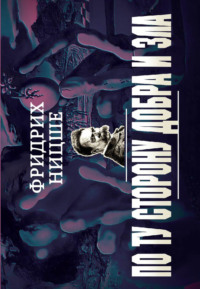 полная версия
полная версияHuman, All-Too-Human: A Book For Free Spirits; Part II
The Elder: You promise too much; you cannot bear this burden.
Pyrrho: Then I will tell men even that, and say that I am too weak, and cannot keep my promise. The greater my unworthiness, the more will they mistrust the truth, when it passes through my lips.
The Elder: You propose to teach distrust of truth?
Pyrrho: Yes; distrust as it never was yet on earth, distrust of anything and everything. This is the only road to truth. The right eye must not trust the left eye, and for some time light must be called darkness: this is the path that you must tread. Do not imagine that it will lead you to fruit trees and fair pastures. You will find on this road little hard grains – these are truths. For years and years you will have to swallow handfuls of lies, so as not to die of hunger, although you know that they are lies. But those grains will be sown and planted, and perhaps, perhaps some day will come the harvest. No one may promise that day, unless he be a fanatic.
The Elder: Friend, friend! Your words too are those of a fanatic!
Pyrrho: You are right! I will be distrustful of all words.
The Elder: Then you will have to be silent.
Pyrrho: I shall tell men that I have to be silent, and that they are to mistrust my silence.
The Elder: So you draw back from your undertaking?
Pyrrho: On the contrary – you have shown me the door through which I must pass.
The Elder: I don't know whether we yet completely understand each other?
Pyrrho: Probably not.
The Elder: If only you understand yourself!
(Pyrrho turns round and laughs.)
The Elder: Ah, friend! Silence and laughter – is that now your whole philosophy?
Pyrrho: There might be a worse.
214European Books. – In reading Montaigne, La Rochefoucauld, La Bruyère, Fontenelle (especially the Dialogues des Morts), Vauvenargues, and Chamfort we are nearer to antiquity than in any group of six authors of other nations. Through these six the spirit of the last centuries before Christ has once more come into being, and they collectively form an important link in the great and still continuous chain of the Renaissance. Their books are raised above all changes of national taste and philosophical nuances from which as a rule every book takes and must take its hue in order to become famous. They contain more real ideas than all the books of German philosophers put together: ideas of the sort that breed ideas – I am at a loss how to define to the end: enough to say that they appear to me writers who wrote neither for children nor for visionaries, neither for virgins nor for Christians, neither for Germans nor for – I am again at a loss how to finish my list. To praise them in plain terms, I may say that had they been written in Greek, they would have been understood by Greeks. How much, on the other hand, would even a Plato have understood of the writings of our best German thinkers – Goethe and Schopenhauer, for instance – to say nothing of the repugnance that he would have felt to their style, particularly to its obscure, exaggerated, and occasionally dry-as-dust elements? And these are defects from which these two among German thinkers suffer least and yet far too much (Goethe as thinker was fonder than he should have been of embracing the cloud, and Schopenhauer almost constantly wanders, not with impunity, among symbols of objects rather than among the objects themselves). – On the other hand, what clearness and graceful precision there is in these Frenchmen! The Greeks, whose ears were most refined, could not but have approved of this art, and one quality they would even have admired and reverenced – the French verbal wit: they were extremely fond of this quality, without being particularly strong in it themselves.
215Fashion and Modernity. – Wherever ignorance, uncleanness, and superstition are still rife, where communication is backward, agriculture poor, and the priesthood powerful, national costumes are still worn. Fashion, on the other hand, rules where the opposite conditions prevail. Fashion is accordingly to be found next to the virtues in modern Europe. Are we to call it their seamy side? – Masculine dress that is fashionable and no longer national proclaims of its wearer: firstly, that he does not wish to appear as an individual or as member of a class or race; that he has made an intentional suppression of these kinds of vanity a law unto himself: secondly, that he is a worker, and has little time for dressing and self-adornment, and moreover regards anything expensive or luxurious in material and cut as out of harmony with his work: lastly, that by his clothes he indicates the more learned and intellectual callings as those to which he stands or would like to stand nearest as a European – whereas such national costumes as still exist would exhibit the occupations of brigand, shepherd, and soldier as the most desirable and distinguished. Within this general character of masculine fashion exist the slight fluctuations demanded by the vanity of young men, the dandies and dawdlers of our great cities – in other words, Europeans who have not yet reached maturity. – European women are as yet far less mature, and for this reason the fluctuations with them are much greater. They also will not have the national costume, and hate to be recognised by their dress as German, French, or Russian. They are, however, very desirous of creating an impression as individuals. Then, too, their dress must leave no one in doubt that they belong to one of the more reputable classes of society (to “good” or “high” or “great” society), and on this score their pretensions are all the greater if they belong scarcely or not at all to that class. Above all, the young woman does not want to wear what an older woman wears, because she thinks she loses her market value if she is suspected of being somewhat advanced in years. The older woman, on the other hand, would like to deceive the world as long as possible by a youthful garb. From this competition must continually arise temporary fashions, in which the youthful element is unmistakably and inimitably apparent. But after the inventive genius of the young female artists has run riot for some time in such indiscreet revelations of youth (or rather, after the inventive genius of older, courtly civilisations and of still existing peoples – in fact, of the whole world of dress – has been pressed into the service, and, say, the Spaniards, Turks, and ancient Greeks have been yoked together for the glorification of fair flesh), then they at last discover, time and again, that they have not been good judges of their own interest; that if they wish to have power over men, the game of hide-and-seek with the beautiful body is more likely to win than naked or half-naked honesty. And then the wheel of taste and vanity turns once more in an opposite direction. The rather older young women find that their kingdom has come, and the competition of the dear, absurd creatures rages again from the beginning. – But the more women advance mentally, and no longer among themselves concede the pre-eminence to an unripe age, the smaller their fluctuations of costume grow and the less elaborate their adornment. A just verdict in this respect must not be based on ancient models – in other words, not on the standard of the dress of women who dwell on the shores of the Mediterranean – but must have an eye to the climatic conditions of the central and northern regions, where the intellectual and creative spirit of Europe now finds its most natural home. – Generally speaking, therefore, it is not change that will be the characteristic mark of fashion and modernity, for change is retrograde, and betokens the still unripened men and women of Europe; but rather the repudiation of national, social, and individual vanity. Accordingly, it is commendable, because involving a saving of time and strength, if certain cities and districts of Europe think and invent for all the rest in the matter of dress, in view of the fact that a sense of form does not seem to have been bestowed upon all. Nor is it really an excessive ambition, so long as these fluctuations still exist, for Paris, for example, to claim to be the sole inventor and innovator in this sphere. If a German, from hatred of these claims on the part of a French city, wishes to dress differently, – as, for example, in the Dürer style, – let him reflect that he then has a costume which the Germans of olden times wore, but which the Germans have not in the slightest degree invented. For there has never been a style of dress that characterised the German as a German. Moreover, let him observe how he looks in his costume, and whether his altogether modern face, with all its hues and wrinkles, does not raise a protest against a Dürer fashion of dress. – Here, where the concepts “modern” and “European” are almost identical, we understand by “Europe” a far wider region than is embraced by the Europe of geography, the little peninsula of Asia. In particular, we must include America, in so far as America is the daughter of our civilisation. On the other hand, not all Europe falls under the heading of cultured “Europe,” but only those nations and divisions of nations which have their common past in Greece, Rome, Judaism, and Christianity.
216“German Virtue.” – There is no denying that from the end of the eighteenth century a current of moral awakening flowed through Europe. Then only Virtue found again the power of speech. She learnt to discover the unrestrained gestures of exaltation and emotion, she was no longer ashamed of herself, and she created philosophies and poems for her own glorification. If we look for the sources of this current, we come upon Rousseau, but the mythical Rousseau, the phantom formed from the impression left by his writings (one might almost say again, his mythically interpreted writings) and by the indications that he provided himself. He and his public constantly worked at the fashioning of this ideal figure. The other origin lies in the resurrection of the Stoical side of Rome's greatness, whereby the French so nobly carried on the task of the Renaissance. With striking success they proceeded from the reproduction of antique forms to the reproduction of antique characters. Thus they may always claim a title to the highest honours, as the nation which has hitherto given the modern world its best books and its best men. How this twofold archetype, the mythical Rousseau and the resurrected spirit of Rome, affected France's weaker neighbours, is particularly noticeable in Germany, which, in consequence of her novel and quite unwonted impulse to seriousness and loftiness in will and self-control, finally came to feel astonishment at her own newfound virtue, and launched into the world the concept “German virtue,” as if this were the most original and hereditary of her possessions. The first great men who transfused into their own blood that French impulse towards greatness and consciousness of the moral will were more honest, and more grateful. Whence comes the moralism of Kant? He is continually reminding us: from Rousseau and the revival of Stoic Rome. The moralism of Schiller has the same source and the same glorification of the source. The moralism of Beethoven in notes is a continual song in praise of Rousseau, the antique French, and Schiller. “Young Germany” was the first to forget its gratitude, because in the meantime people had listened to the preachers of hatred of the French. The “young German” came to the fore with more consciousness than is generally allowed to youths. When he investigated his paternity, he might well think of the proximity of Schiller, Schleiermacher, and Fichte. But he should have looked for his grandfathers in Paris and Geneva, and it was very short-sighted of him to believe what he believed: that virtue was not more than thirty years old. People became used to demanding that the word “German” should connote “virtue,” and this process has not been wholly forgotten to this day. – Be it observed further that this moral awakening, as may almost be guessed, has resulted only in drawbacks and obstacles to the recognition of moral phenomena. What is the entire German philosophy, starting from Kant, with all its French, English, and Italian offshoots and by-products? A semi-theological attack upon Helvetius, a rejection of the slowly and laboriously acquired views and signposts of the right road, which in the end he collected and expressed so well. To this day Helvetius is the best-abused of all good moralists and good men in Germany.
217Classic and Romantic. – Both classically and romantically minded spirits – two species that always exist – cherish a vision of the future; but the former derive their vision from the strength of their time, the latter from its weakness.
218The Machine as Teacher. – Machinery teaches in itself the dovetailed working of masses of men, in activities where each has but one thing to do. It is the model of party organisations and of warfare. On the other hand, it does not teach individual self-glorification, for it makes of the many a machine, and of each individual a tool for one purpose. Its most general effect is to teach the advantage of centralisation.
219Unable to Settle. – One likes to live in a small town. But from time to time just this small town drives us out into bare and lonely Nature, especially when we think we know it too well. Finally, in order to refresh ourselves from Nature, we go to the big town. A few draughts from this cup and we see its dregs, and the circle begins afresh, with the small town as starting-point. – So the moderns live; they are in all things rather too thorough to be able to settle like the men of other days.
220Reaction against the Civilisation of Machinery. – The machine, itself a product of the highest mental powers, sets in motion hardly any but the lower, unthinking forces of the men who serve it. True, it unfetters a vast quantity of force which would otherwise lie dormant. But it does not communicate the impulse to climb higher, to improve, to become artistic. It creates activity and monotony, but this in the long-run produces a counter-effect, a despairing ennui of the soul, which through machinery has learnt to hanker after the variety of leisure.
221The Danger of Enlightenment. – All the half-insane, theatrical, bestially cruel, licentious, and especially sentimental and self-intoxicating elements which go to form the true revolutionary substance, and became flesh and spirit, before the revolution, in Rousseau – all this composite being, with factitious enthusiasm, finally set even “enlightenment” upon its fanatical head, which thereby began itself to shine as in an illuminating halo. Yet, enlightenment is essentially foreign to that phenomenon, and, if left to itself, would have pierced silently through the clouds like a shaft of light, long content to transfigure individuals alone, and thus only slowly transfiguring national customs and institutions as well. But now, bound hand and foot to a violent and abrupt monster, enlightenment itself became violent and abrupt. Its danger has therefore become almost greater than its useful quality of liberation and illumination, which it introduced into the great revolutionary movement. Whoever grasps this will also know from what confusion it has to be extricated, from what impurities to be cleansed, in order that it may then by itself continue the work of enlightenment and also nip the revolution in the bud and nullify its effects.
222Passion in the Middle Ages. – The Middle Ages are the period of great passions. Neither antiquity nor our period possesses this widening of the soul. Never was the capacity of the soul greater or measured by larger standards. The physical, primeval sensuality of the barbarian races and the over-soulful, over-vigilant, over-brilliant eyes of Christian mystics, the most childish and youthful and the most over-ripe and world-weary, the savageness of the beast of prey and the effeminacy and excessive refinement of the late antique spirit – all these elements were then not seldom united in one and the same person. Thus, if a man was seized by a passion, the rapidity of the torrent must have been greater, the whirl more confused, the fall deeper than ever before. – We modern men may be content to feel that we have suffered a loss here.
223Robbing and Saving. – All intellectual movements whereby the great may hope to rob and the small to save are sure to prosper. That is why, for instance, the German Reformation made progress.
224Gladsome Souls. – When even a remote hint of drink, drunkenness, and an evil-smelling kind of jocularity was given, the souls of the old Germans waxed gladsome. Otherwise they were depressed, but here they found something they really understood.
225Debauchery at Athens. – Even when the fish-market of Athens acquired its thinkers and poets, Greek debauchery had a more idyllic and refined appearance than Roman or German debauchery ever had. The voice of Juvenal would have sounded there like a hollow trumpet, and would have been answered by a good-natured and almost childish outburst of laughter.
226Cleverness of the Greek. – As the desire for victory and pre-eminence is an ineradicable trait of human nature, older and more primitive than any respect of or joy in equality, the Greek State sanctioned gymnastic and artistic competitions among equals. In other words, it marked out an arena where this impulse to conquer would find a vent without jeopardising the political order. With the final decline of gymnastic and artistic contests the Greek State fell into a condition of profound unrest and dissolution.
227The “Eternal Epicurus.” – Epicurus has lived in all periods, and lives yet, unbeknown to those who called and still call themselves Epicureans, and without repute among philosophers. He has himself even forgotten his own name – that was the heaviest luggage that he ever cast off.
228The Style of Superiority. – “University slang,” the speech of the German students, has its origin among the students who do not study. The latter know how to acquire a preponderance over their more serious fellows by exposing all the farcical elements of culture, respectability, erudition, order, and moderation, and by having words taken from these realms always on their lips, like the better and more learned students, but with malice in their glance and an accompanying grimace. This language of superiority – the only one that is original in Germany – is nowadays unconsciously used by statesmen and newspaper critics as well. It is a continual process of ironical quotation, a restless, cantankerous squinting of the eye right and left, a language of inverted commas and grimaces.
229The Recluse. – We retire into seclusion, but not from personal misgivings, as if the political and social conditions of the day did not satisfy us; rather because by our retirement we try to save and collect forces which will some day be urgently needed by culture, the more this present is this present, and, as such, fulfils its task. We form a capital and try to make it secure, but, as in times of real danger, our method is to bury our hoard.
230Tyrants of the Intellect. – In our times, any one who expressed a single moral trait so thoroughly as the characters of Theophrastus and Molière do, would be considered ill, and be spoken of as possessing “a fixed idea.” The Athens of the third century, if we could visit it, would appear to us populated by fools. Nowadays the democracy of ideas rules in every brain – there the multitude collectively is lord. A single idea that tried to be lord is now called, as above stated, “a fixed idea.” This is our method of murdering tyrants – we hint at the madhouse.
231A Most Dangerous Emigration. – In Russia there is an emigration of the intelligence. People cross the frontier in order to read and write good books. Thus, however, they are working towards turning their country, abandoned by the intellect, into a gaping Asiatic maw, which would fain swallow our little Europe.
232Political Fools. – The almost religious love of the king was transferred by the Greeks, when the monarchy was abolished, to the polis. An idea can be loved more than a person, and does not thwart the lover so often as a beloved human being (for the more men know themselves to be loved, the less considerate they usually become, until they are no longer worthy of love, and a rift really arises). Hence the reverence for State and polis was greater than the reverence for princes had ever been. The Greeks are the political fools of ancient history – today other nations boast that distinction.
233Against Neglect of the Eyes. – Might one not find among the cultured classes of England, who read the Times, a decline in their powers of sight every ten years?
234Great Works and Great Faith. – One man had great works, but his comrade had great faith in these works. They were inseparable, but obviously the former was entirely dependent upon the latter.
235The Sociable Man. – “I don't get on well with myself,” said some one in explanation of his fondness for society. “Society has a stronger digestion than I have, and can put up with me.”
236Shutting the Mind's Eyes. – If we are practised and accustomed to reflect upon our actions, we must nevertheless close the inner eye while performing an action (be this even only writing letters or eating or drinking). Even in conversation with average people we must know how to obscure our own mental vision in order to attain and grasp average thinking. This shutting of the eyes is a conscious act and can be achieved by the will.
237The Most Terrible Revenge. – If we wish to take a thorough revenge upon an opponent, we must wait until we have our hand quite full of truths and equities, and can calmly use the whole lot against him. Hence the exercise of revenge may be identified with the exercise of equity. It is the most terrible kind of revenge, for there is no higher court to which an appeal can be made. Thus did Voltaire revenge himself on Piron, with five lines that sum up Piron's whole life, work, and character: every word is a truth. So too he revenged himself upon Frederick the Great in a letter to him from Ferney.
238Taxes of Luxury. – In shops we buy the most necessary and urgent things, and have to pay very dear, because we pay as well for what is also to be had there cheap, but seldom finds a customer – articles of luxury that minister to pleasure. Thus luxury lays a constant tax upon the man of simple life who does without luxuries.
239Why Beggars still Live. – If all alms were given only out of compassion, the whole tribe of beggars would long since have died of starvation.
240Why Beggars still Live. – The greatest of almsgivers is cowardice.
241How the Thinker Makes Use of a Conversation. – Without being eavesdroppers, we can hear a good deal if we are able to see well, and at the same time to let ourselves occasionally get out of our own sight. But people do not know how to make use of a conversation. They pay far too much attention to what they want to say and reply, whereas the true listener is often contented to make a provisional answer and to say something merely as a payment on account of politeness, but on the other hand, with his memory lurking in ambush, carries away with him all that the other said, together with his tones and gestures in speaking. – In ordinary conversation every one thinks he is the leader, just as if two ships, sailing side by side and giving each other a slight push here and there, were each firmly convinced that the other ship was following or even being towed.
242The Art of Excusing Oneself. – If some one excuses himself to us, he has to make out a very good case, otherwise we readily come to feel ourselves the culprits, and experience an unpleasant emotion.
243Impossible Intercourse. – The ship of your thoughts goes too deep for you to be able to travel with it in the waters of these friendly, decorous, obliging people. There are too many shallows and sandbanks: you would have to tack and turn, and would find yourself continually at your wits' end, and they would soon also be in perplexity as to your perplexity, the reason for which they cannot divine.
244The Fox of Foxes. – A true fox not only calls sour the grapes he cannot reach, but also those he has reached and snatched from the grasp of others.
245In Intimate Intercourse. – However closely men are connected, there are still all the four quarters of the heavens in their common horizon, and at times they become aware of this fact.









